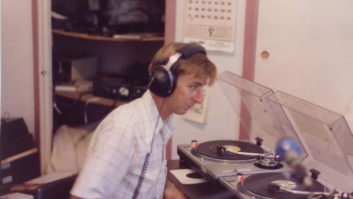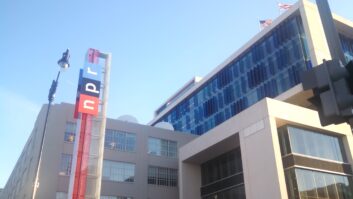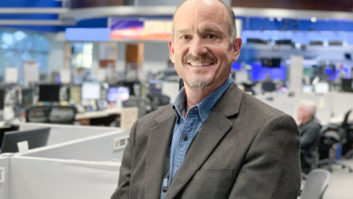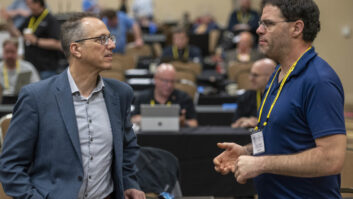A few issues ago, I invited readers to share photos and stories illustrating special memories of working around radio. Here are some of your replies. — Paul McLane
PICTURES DON’T DO IT JUSTICE

Hi Paul, I enjoyed your column about radio memories. Over my 25 years in the business, I can think of many I have had — even if a camera may have not been handy!
However, this one was too good to pass up. It was 2007 when I was APD and afternoon host at WERV(FM) Aurora/Chicago.
I had finished up my shift and was getting ready to head home when I saw this impressive sky behind our facility. Our transmitter field backed up to a rail yard, and the view looking west was just gorgeous. Even the picture doesn’t do it justice. But the silhouette of our tower against the sky at dusk really struck me. Hope you enjoy!
I love this business, not only for its intricacies, but also its simplicity.
Scott Childers
Program Director & Afternoon Host
WSSR(FM)
Joliet, Ill.
TOWER LIGHTS OPERATING NORMALLY
Always thought working in radio was special.
Lots of energy in the building. Combo DJs did a million things at once: cuing records and ETs (carts after about 1960), answering the phones, ripping and reading the news (in the small stations where I started) — all of that made us DJs a special breed. I don’t work in radio anymore, but I do own some stations.
When I go to the stations these days, I stare into mostly empty studios. The VU meters are moving, but there are no humans. (O.K., I tend to show up after morning drive when shows are live.)
My point: While voice tracking can sound live — it’s all about the talent — and you can utilize your company’s best jocks on stations that otherwise would have mediocre air personnel, automation has resulted in a loss of the specialness of working in radio, in my view.
Your photo reminded me of my first job in radio at a daytimer. I shut down the Gates transmitter at sundown, opened the back door and stared up at the tower in the twilight. Entry in the transmitter log: “Tower lights observed operating normally.” As I drove out of the parking lot, I thought I was working in a pretty special business.
I spent 15 years (1966–81) at WPGC in Washington during the top 40 days, started as general sales manager, ended as GM. Now that experience was truly special!
Bill Prettyman
President
Prettyman Broadcasting Co.
Salisbury, Md.
WORK FOR THE GLOW
Most of the time, you work by yourself.
Tonight you get the call while you are sleeping. You get up, dress and make the trip to the transmitter building alone. Rarely do you work on a project with a partner. Trips to remote sites give you time to wake and run through the possible causes for this outage. You have a plan of attack ready when you pull up. Fighting the gate lock in the dark is never fun, but maybe that will be the hardest thing you face this night.
If the transmitter is collocated with the studios, the overnight guy will be there; but you won’t have the admin staff around, so it is quiet to do your work. No salespeople or station manager or announcers looking over your shoulder.
There was that time during the day you were working on that dead transmitter, and it seemed like the entire station staff had crowed into the transmitter room, all chatting and laughing. Thank goodness the owner came in and noticed. He told the whole gang to take off, that you wouldn’t be doing a thing until the room was empty. Then he gave you a wink, turned and closed the door behind him.

Photo by James E. O’Neal But tonight it is a trip to the remote site. Just you and your tool box. And as you open the door, you immediately notice something missing. It’s just a cold room. The normal golden glow is gone. The long hallway is dark. With the transmitter off, the building’s “night light” from the finals and modulators isn’t there. The eerie silence of the absence of the blower motor isn’t there, either. There’s nothing so sad to an engineer than a rig that isn’t alive.
The technical part of the job is always challenging. Troubleshooting and finding the problem, and creating a solution for fixing it — that’s the mental reward. It’s your job to fix it. Actually, it’s your job to get it fixed. That means that it is always all right to reach out for help. That’s something you realized when you were a younger engineer. You can’t know everything. It was okay to grow past your young pride and call for help or an idea when you are stumped.
Tonight, though, it’s an easy fix. The thunderstorms that rolled through took out a couple of shotgun fuses. You had hoped that was all it was. Someday – and soon – you need to try one of those cool fuse/breakers things that you can reset remotely that you learned about in Bisset’s Workbench column. (Either that or be prepared to make a few more trips here during the rainy season.)
After looking for other signs of lightning damage and closing all the doors, you turn on the filaments and watch for the low-voltage systems to come online. Just seeing the meters move makes you feel better. You remember another time when the FM took a lightning hit and blew out some fuses; the entire Bakelite fuse holder was gone. Not even any residue. Just the ends of the wires and a couple of brass fuse ends. It all just vaporized. So this time you start at low power and the blower screams as the tubes glow.
There’s something about the glow of the tubes. The new solid-state transmitters are great, but they don’t seem to have the same character with just a bunch of LED lights and a lit number pad. After another check, it’s time to switch to full power.

A call to the studios and audio is restored with a station ID and the next song. Now, the room warms up. No need for an air audio monitor when you can hear the coils singing. Time to take readings, make your log entries and pack up your tools.
And if you’re really honest with yourself, you will admit that you talk to your rig, and tell it once more, “You’re all better, my friend.”
The walk down the hall is easier in the glow of the tubes.
Bill Betlej
Mary Baldwin College
Staunton, Va.
SHARE THE MAGIC
I am holding a CP for WDXD(LP) 101.9 in Tallahassee, Fla. The 33-watt LPFM, licensed to Delta Star Radio of Florida Inc., is under construction.
Shown in the photo is my 10-year-old grandson, Benjamin Best, also of Tallahassee, learning how to operate the soon-to-be on-air studio before it goes live. Benjamin will host a Sunday afternoon Christian music show. The studio is being equipped with turntables, a cassette deck, several CD and an MP3 player, as well as computer equipment. WDXD will air a primary country (1950s to the present) format, with some specialty programming on the weekends.
Radio has always held that magic touch for me, and I hope that can be shared through WDXD.
We still have to build the 180-foot tower and get a transmitter, antenna and EAS before launching the LPFM.
Alan McCall
Delta Star Radio of Florida Inc./WDXD(LP)
Tallahassee, Fla.







